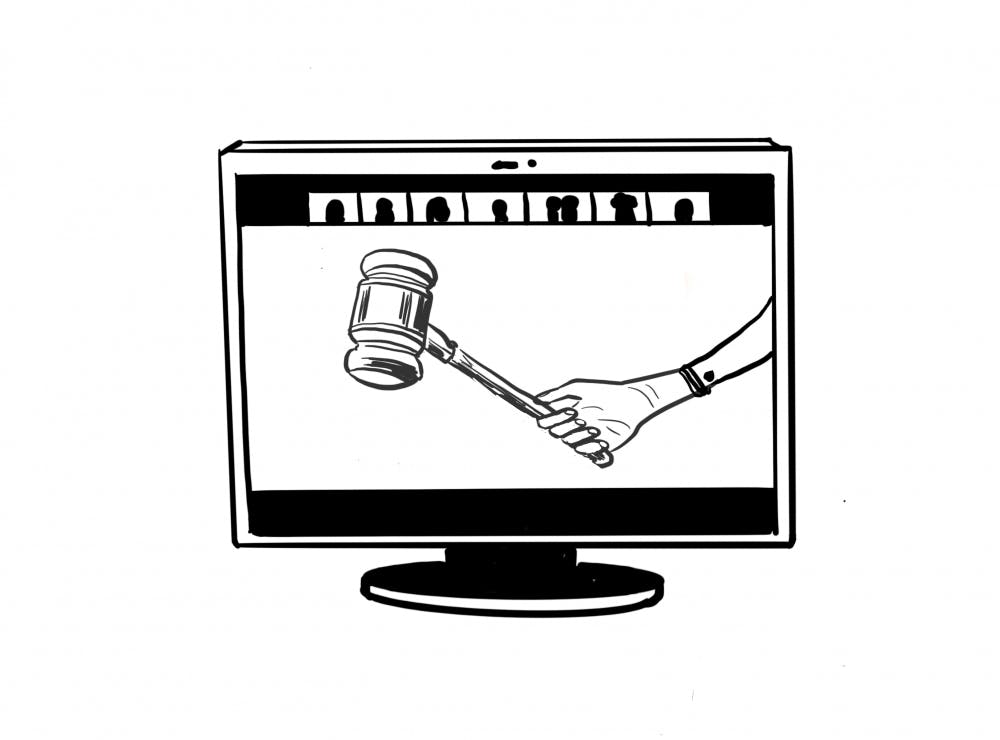While the U.S. District Court of Rhode Island has transitioned to a predominately remote capacity due to the ongoing COVID-19 pandemic, “the wheels of justice have not come to a grinding halt,” said attorney Steven Richard.
Since closing down the federal courthouse building in March, the Court has conducted the majority of its legal proceedings on Zoom, including civil bench trials, depositions, evidentiary hearings and criminal sentencings.
But neither criminal nor civil jury trials have been conducted via Zoom. While the virtual option is available for civil trials, it has not been utilized because all potential cases to date have been settled prior to going to trial, said Chief Judge John McConnell ’80. The three civil jury trials that have occurred since March conducted in person at the courthouse in October with social distancing protocols in place.
Handling criminal jury trials remains the largest obstacle for the Court, according to McConnell. Conducting criminal trials remotely raises questions about the defendant’s constitutional rights, especially with regard to their sixth amendment rights to confront witnesses and to have an impartial jury. McConnell noted that the Constitution provides no answers to timely questions such as if defendants have the right to confront maskless witnesses.
Furthermore, the inability to bring jurors into the courtroom raises concerns about constructing a demographically-representative jury and ensuring the jury follows court procedure, McConnell said. In order to make sure potential jurors can participate fully via Zoom, the Court has created questionnaires asking about accessibility factors including Internet connection, computer equipment and home distractions. Potential jurors would then be filtered out according to their survey responses.
Still, these measures do not remedy all concerns about remote juries, specifically regarding the lack of control the Court can exert online, said attorney Caroline Murphy, who worked in a mock bench trial, depositions and mediations. Worries persist over jurors looking up information or speaking with other people in the room, which would compromise their neutrality.
Despite the challenges, both attorneys and judges involved in the Court expressed surprise over how well proceedings have functioned remotely.
"This will sound odd, but I find it oftentimes more personal,” McConnell said. “In criminal cases vis-à-vis the defendant, I am far more engaged with the person via Zoom than I am in the formal court setting.”
McConnell added that he prefers remote trials over in-person, socially distanced ones, finding the in-person hearings in October a difficult experience. “The masking and the distancing brought a level of disconnect amongst everyone in there,” he said. “It just felt weird and disengaged; it felt different than a trial should.”
Additionally, the unprecedented nature of the pandemic created greater collaboration across the constituencies of the legal community. For instance, the chief judges of the first circuit now meet together once a week, which “never happened before,” McConnell said.
During online trials, Richard also noted a greater degree of collegiality among attorneys and more willingness to work together with opposing counsel.
Zoom has also removed barriers for public and press engagement with the federal court. Due to restrictions on video recordings in federal court, physically going to the courthouse had previously been the only option to watch court proceedings. But now that proceedings are virtual, the Court makes every Zoom link open to the public, leading to greater community interaction, according to McConnell. In particular, he has noticed more family members watching cases than prior to the pandemic.
“I hope that it is the beginning of allowing cameras in the courtroom,” he said. “We've shown through Zoom that people operate appropriately, and it has done so much to open it up to the public.”
Changes in recording policy are not the only potential adjustments that might be made in the Court after the pandemic. Murphy said mediations have adapted particularly well to a Zoom setting, citing how the breakout room function allows mediators to quickly and seamlessly move between parties. She believes mediations may remain online even when public health conditions no longer require such precautions.
Last year, McConnell helped establish a task force committed to forming a safe reopening plan for the Court. The task force consists of Judge William Smith of the U.S. District Court of R.I., Deputy Clerk Frank Perry and immunologist Dr. Erin Bromage as well as other federal court stakeholders such as attorneys, clerks and marshals.
But due to the relative success of the transition to Zoom, McConnell sees little reason to rush back to in-person proceedings. “Remote Zoom administration of justice has done well enough,” McConnell said. “Why would we contribute to the risk if we don't have to?”

ADVERTISEMENT




